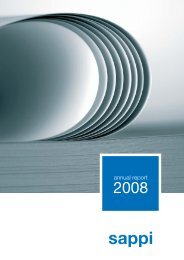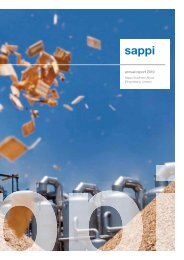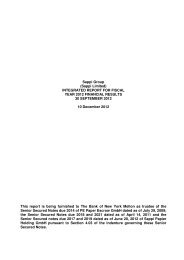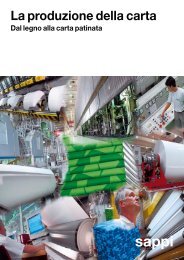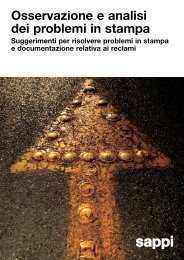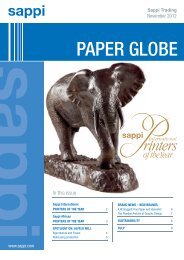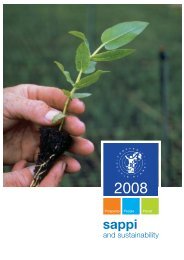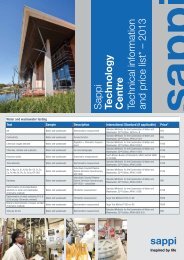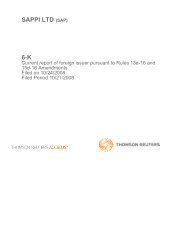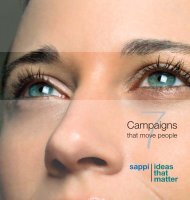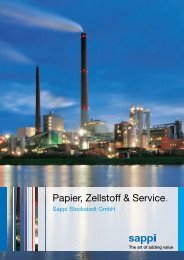2007 Annual Report - Sappi
2007 Annual Report - Sappi
2007 Annual Report - Sappi
You also want an ePaper? Increase the reach of your titles
YUMPU automatically turns print PDFs into web optimized ePapers that Google loves.
Overview<br />
The Forest Products business represented 20% of group<br />
sales in <strong>2007</strong> and generated 72% of operating profit excluding<br />
special items*. Operating profit excluding special items increased<br />
from US$115 million in 2006 to US$224 million in 2008, a return<br />
on net operating assets of 15%.<br />
Description<br />
<strong>Sappi</strong> Forest Products produces nearly 1.7 million tons of<br />
pulp – almost half the group’s output – and provides a pulp<br />
revenue stream that effectively hedges the purchases of pulp by<br />
our European division. This virtually eliminates the group’s overall<br />
exposure to changes in world pulp prices.<br />
<strong>Sappi</strong> Saiccor is the world’s largest manufacturer of chemical<br />
cellulose and has a low cost position. The uses of chemical<br />
cellulose range from the production of viscose and lyocell fibres,<br />
moulding powders, cellophane, cellulose acetate for filter tow<br />
used in cigarette filters, and excipients for pharmaceuticals.<br />
<strong>Sappi</strong> Kraft makes bleached and unbleached kraft pulp,<br />
containerboard, packaging paper and newsprint.<br />
<strong>Sappi</strong> Forests has some 550,000 hectares of land under direct<br />
and indirect management. More than 37 million tons of timber<br />
stands on this land. <strong>Sappi</strong>’s own land provides 70% of the wood<br />
needs of our Southern African businesses which amounts to<br />
some 6.2 million tons per annum. All the wood comes from<br />
FSC certified and ISO 9000 certified plantations. <strong>Sappi</strong>’s sawmill<br />
also produces sawn timber for the construction industry.<br />
Major factors in the improvement were strong demand and<br />
prices in the international pulp markets, good demand in<br />
Southern Africa for our newsprint and packaging paper and the<br />
weaker Rand compared to fiscal 2006.<br />
Our productivity improved during the year at all operations, but<br />
particularly in the Kraft and Usutu businesses. There is scope<br />
to improve Kraft productivity further which is planned for the<br />
year ahead. The recovery boiler at Usutu Mill will be renewed in<br />
2008, leading to improved reliability at the mill. The project will<br />
require a seven-week shut of the mill.<br />
We are faced with high and rising costs including wood,<br />
coal and chemicals. Employment cost increases rose at above<br />
consumer price inflation during the year as a result of the<br />
buoyant South African economy and the shortage of technical<br />
skills in the country. We have stepped up on training programmes<br />
and have participated in an overseas recruitment initiative to<br />
attract qualified young South Africans back to South Africa.<br />
We had a number of management changes in the division<br />
following the retirement of the chief executive officer in December,<br />
all of which were internal. The team is settling well and looking<br />
at fresh ways of improving the business performance.<br />
* See note on segmental results for details of special items.<br />
sappi limited | 07 | annual report 29



